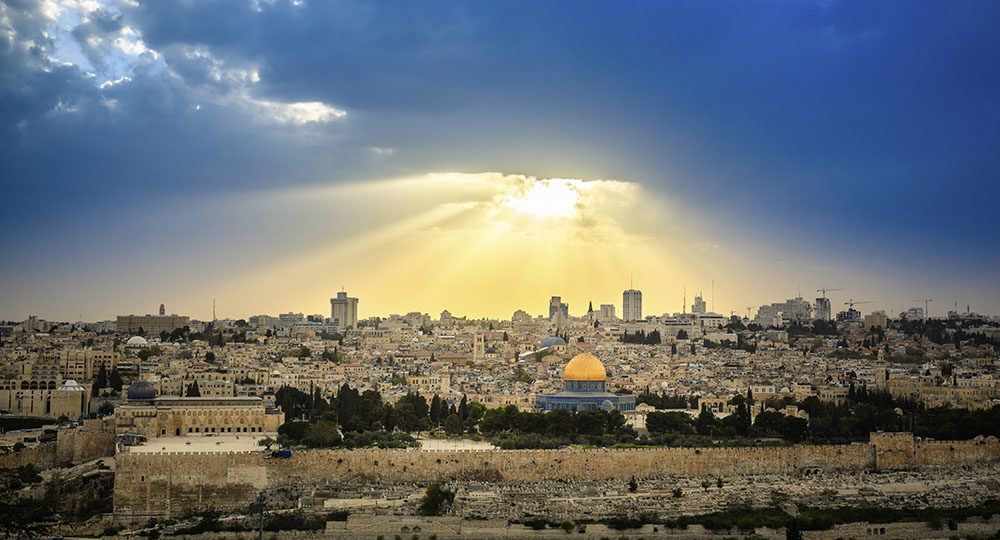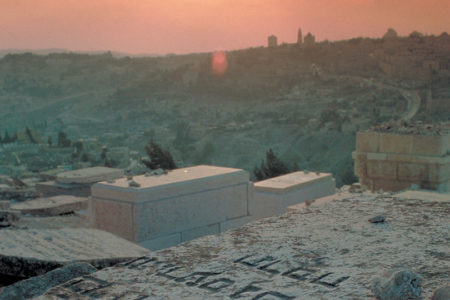The Final Cleansing Zechariah 13
Zechariah 12—14 comprises a God-breathed foreview of the great end-times drama that is at once unspeakably awful and inexpressibly blessed: awful because it focuses on the dreadful travail yet to befall the Jewish people (12:1–2; 13:7—14:2) and blessed because that time of travail is revealed as the time Yahweh will show Himself the powerful and gracious covenant keeping God of Israel (12:10—13:1; 13:9; 14:8–9, 16–21).
The focus of chapter 13 is twofold. First, Zechariah described the ultimate cleansing God will provide for that nation (13:1–6). Then the prophet recorded, in brief but disturbing fashion, the chastening necessary to accomplish that cleansing (13:7–9).
A Fountain
for Israel
The chapter opens with the glorious announcement, “In that day there shall be a fountain opened to the house of David and to the inhabitants of Jerusalem for sin and for uncleanness” (13:1). Because “the Spirit of grace and of supplications” will have been poured out on Israel (12:10) and because that nation will have looked on the one “whom they have pierced” (12:10) and every family mourned and repented (12:11–14), God will open such afountain of cleansing to Israel.The term used for “fountain” never means a stagnant pool; it speaks of a spring of fresh water (cf. Prov. 18:4).
Ceremonial cleansing by water appears often in the Levitical system of worship (Ex. 30:17–21; Num. 8:5–7; cf. Num. 19:9; Ezek. 36:25). But here the picture is of a spring of water that bursts from the side of a hill with a never-ending supply of living water—a “fountain opened.” The picture suggests a contrast: The waters provided for cleansing in the law were blessed; but “in that day” a fountain shall be opened whose waters will be sufficient to wash all of Israel from sin and uncleanness (cf. 12:10–14, where the titular phrase the house of David, and upon the inhabitants of Jerusalem [v. 10] clearly means the entire covenant-nation).
The hope and longing excited by such a promise was gloriously fulfilled in Jesus, who “gave himself for us that he might redeem us from all iniquity [i.e., cleanse from sin], and purify unto himself a people [i.e., cleanse from uncleanness]” (Ti. 2:14).
In verses 2–6, the prophet focused on the specific uncleanness from which the nation will be finally purified. First, idolatry—the sin that so often beset Israel in the Old Testament—will be so thoroughly purged that the names of the idols will not be remembered (God specifically forbids mentioning the names of false gods, v. 2; cf. Ex. 23:13; Ps. 16:4). Although the seventy-year captivity in Babylon rooted out Israel’s tendency to go after idols, that wickedness will manifest itself again in the end-times drama (Rev. 9:20; 13:4, 15); and thus the promise of this verse awaits fulfillment.
An End to False Prophets
Second, false prophets will be eradicated from the life and land of Israel. Prohibitions against false prophets abound in the Hebrew Scriptures (Dt. 13:1–5; 18:20–22; Isa. 5:20; 8:19; 9:13–15; Jer. 6:13; Ezek. 14:9–10; Mic. 3:5–7), but the Israelites often succumbed to the temptation to embrace a lie (Num. 16; Jud. 18; 1 Ki. 22:1–28). Thus the blessedness of the promise that in the day of Israel’s repentance (cf. the six uses of the phrase in that day in Zechariah 12), God will “cause the prophets and the unclean spirit to pass out of the land” (13:2).
This is the only appearance in the Old Testament of the phrase unclean spirit (cf. Mt. 10:1; Rev. 16:13). The contrast is clearly to the “Spirit of grace and of supplications,” whom Yahweh poured out on Israel (12:10). It is God’s Spirit who compels and enables us to put away pride and cast ourselves on God’s grace (Jn. 6:44; Acts 16:14). The unclean spirit compels us to reject God’s provision and cling to our own righteousness.
The prophet then drew a dramatic picture of the desperate plight of false prophets in the day Yahweh determines to eradicate them. False prophets will be forsaken by their protectors (13:3). Every worshiper of Yahweh owes Him an allegiance that transcends all other relationships and loyalties (cf. Gen. 22; Ex. 32:27–28; Dt. 33:8–11), and this responsibility was made specific with reference to the near relatives of a false prophet (Dt. 13:6–11). But that ethic was seldom honored. Thus there is drama in this picture of parents indicting and then executing their son for speaking lies. And the drama is intensified because these parents seem to exceed what the law demands. The law demanded a judicial process, but Zechariah said the parents put their lying son to death “when he prophesieth”—in the very act of prophesying. Again, rather than stoning him (Dt. 13:10), they “thrust him through.” These parents are so zealous for the truth they refuse to let another lying word proceed from the false prophet’s mouth, even though he be their own son.
The false prophets also will be condemned by their own predictions (13:4). Moses established the standard for a true prophet: Every one of his predictive prophecies must come to pass precisely (Dt. 18:21–22; cf. 1 Sam. 10:1–9). Further, Yahweh had often insisted that it was He who “frustrateth the tokens of the liars” (Isa. 44:25; cf. Mic. 3:7). In the day of Israel’s deliverance, Yahweh will order events so that the words of a false prophet will be quickly and unmistakably proven fallacious: “And it shall come to pass, in that day, that the prophets shall be ashamed” (13:4). Ashamed speaks not only of emotional chagrin or embarrassment but of putting hope in what fails you.
False prophets will experience a sudden commitment to “truthin-advertising” standards: They will refuse the rough garment so typical of Old Testament prophets (1 Ki. 19:13, 19; 2 Ki. 1:8; 2:13; Mt. 3:4) because they know that any pretense will be immediately unmasked.
And finally, false prophets will flounder in their perjuries (13:5–6). The picture is almost humorous. The false prophet—so dominant and influential within Israel in the day of her rebelliousness—will be reduced to telling the most insipid lies to escape the shame to be heaped on him if he is discovered. He will insist he has only been a farmer and a keeper of cattle (cf. Amos 7:14)—busy but humble occupations that would have afforded neither the time nor the opportunity to learn the arcane methods of the pretender prophet: “I am no prophet, I am a farmer; for man taught me to keep cattle from my youth” (13:5). The verb translated “taught” implies “to acquire, to buy.” Thus he will imply someone “obtained me in order to use me in this fashion.” This lie may include the claim to have been sold as a slave, strengthening his case against the idea that he could be a false prophet.
The charade becomes more complicated when the false prophet is asked, “What are these wounds in [Hebrew, “between,” cf. 2 Ki. 9:24] thine hands?” The word speaks of fresh wounds. The reference is clearly to the selfinflicted chest wounds often detected on the bodies of false prophets who would cut themselves in a frenzied attempt to procure answers from their chimerical gods (1 Ki. 18:28; Jer. 47:5; 48:37). Yahweh had specifically interdicted such activity (Lev. 19:28; Dt. 14:1). Thus such wounds unveil the true identity of this liar. His attempt at an explanation only reinforces the impression that he is lying.
A Final Conflict
In 13:7-9, the prophet Zechariah focused on the means by which the covenant promises of Yahweh will become the possession of a redeemed and restored nation of Israel. The transition is not as abrupt as it may seem. Zechariah already described false shepherds (chapter 11) in order to contrast them to a faithful shepherd. Now he uses false prophets (13:2-6) as a backdrop for his portrait of the smitten Shepherd, who undoubtedly is Jesus. On the night of His betrayal and arrest, the Lord Jesus quoted this verse and applied it to Himself and His disciples (Mt. 26:31; Mk. 14:27).
It is Yahweh who calls on the sword-the symbol of judicial power (Rom. 13:4)-to smite the True Shepherd and cause the sheep to be scattered:
Awake, 0 sword, against my shepherd, and against the man who is my fellow, saith the LORD of hosts; smite the shepherd, and the sheep shall be scattered; and I will turn mine hand upon the little ones (v. 7).
This verse might cause one to infer that the Shepherd committed some awful wrong. But Isaiah’s song centuries earlier portrayed the Lord’s Servant as “smitten of God” (Isa. 53:4) because “the LORD hath laid on him the iniquity of us all” (Isa. 53:6) and because “it pleased the LORD to bruise him” (53:10).
Most remarkable is the title assigned the smitten Shepherd: my fellow. This term is only used in Leviticus, and there eleven times, to refer to one’s nearest kin. Bible scholar Charles Feinberg characterized the term as meaning “My Companion, My Associate, My Friend, My Confidant, the One united to Me, the One whom I have associated with Myself, My Equal, My Nearest of Kin.” He then concluded, “It would not be possible to state in stronger terms the unimpeachable deity of the Messiah of Israel.”1
Indeed, when Jesus said, “I and my Father are one” (Jn. 10:30), He spoke in the context of His claim to be the good Shepherd who would lay down His life for His sheep. That statement of essential oneness with the Father may be taken as Jesus’ commentary on Zechariah 13:7. The prophet anticipated Messiah’s twofold nature: “the man who is my fellow” and the one smitten by God.
As a result of the awful smiting the Shepherd received, the sheep of Israel (cf. Zech. 11) would be scattered and God’s chastening hand turned against them (13:7). The immediate and literal fulfillment of that prophecy is found in the apostles’ flight on the night of Jesus’ arrest (Mt. 26:31, 56).
But the importance of the prophet’s words extends beyond that initial night to the dispersion of the nation of Israel as sheep who have deserted their Shepherd. There is a “blindness in part” that has been imposed on Israel (Rom. 11:25), but her covenant-keeping God has not deserted her. Though that shepherdless nation has suffered awfully, God has preservedand will preserve-a remnant (cf. 2 Sam. 8:2; Ezek. 5:2, 12; Isa. 6:13). Though that remnant will be refined through the fires of suffering, one glorious day it will call on His name. On that day the Jewish people will be heard by Him and once again be gathered into the care of their smitten but resurrected Shepherd to confess together, “The LORD is my God” (13:9).
ENDNOTE
- Charles Lee Feinberg, Zechariah: Israel’s Comfort and Glory, American Board of Missions to the Jews, Inc., New York, 1952, p. 136.








So, when are two thirds of the Jews in Israel to be killed? And does that mean they’ll be lost? Since only the third part is refined and call on God’s name and God will hear them and claim them (the third) as his people?
What do you say? Thanks!
It seems to me that Zechariah 13:6 isn’t referring to the false prophets but to the Messiah. He was the one pierced in the “house of His friends”, even the house of His brethren
Your commentary of Zechariah 13 certainly helped me with my study of the Book of Zechariah.
Thank you. Blessings